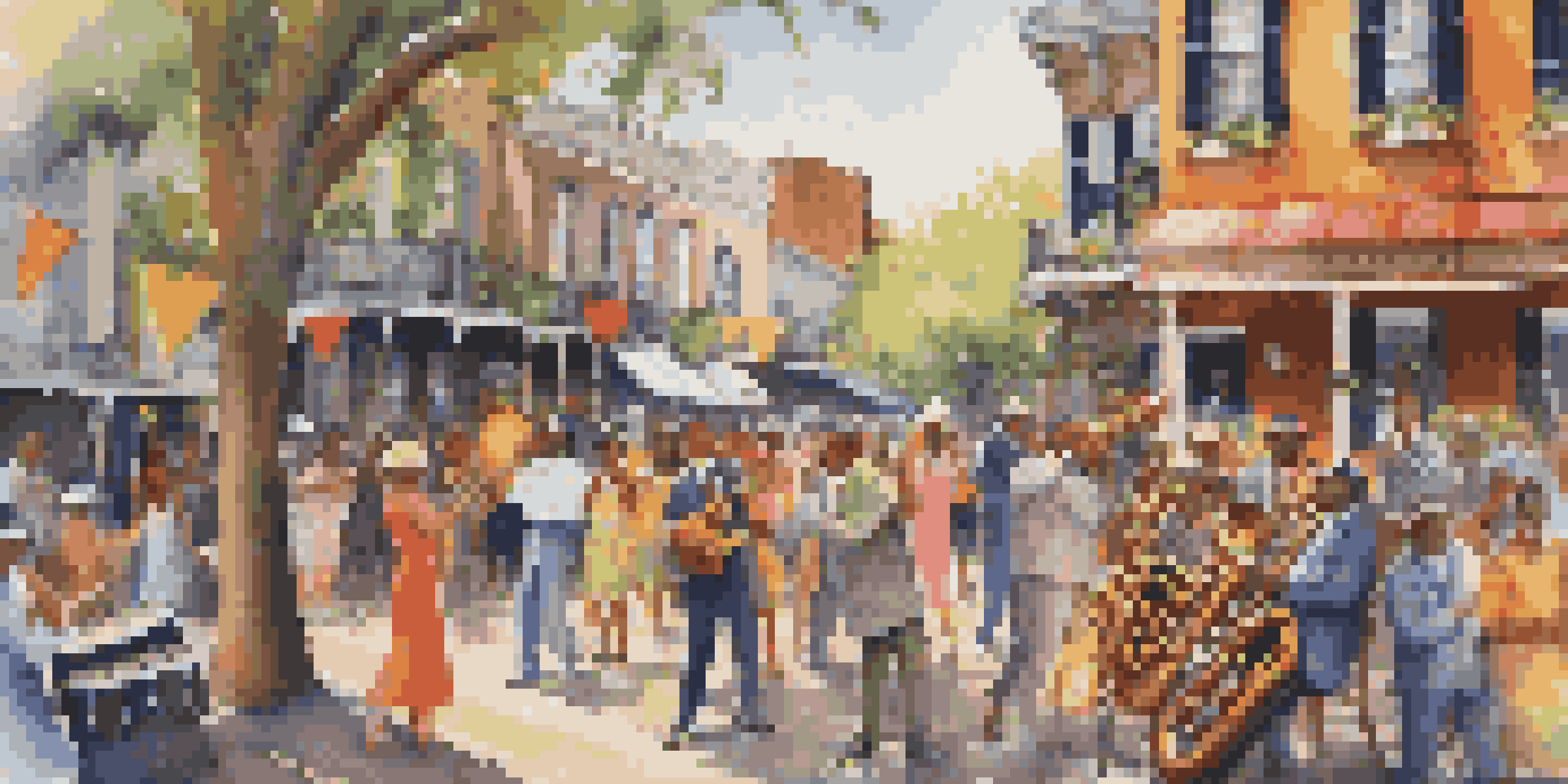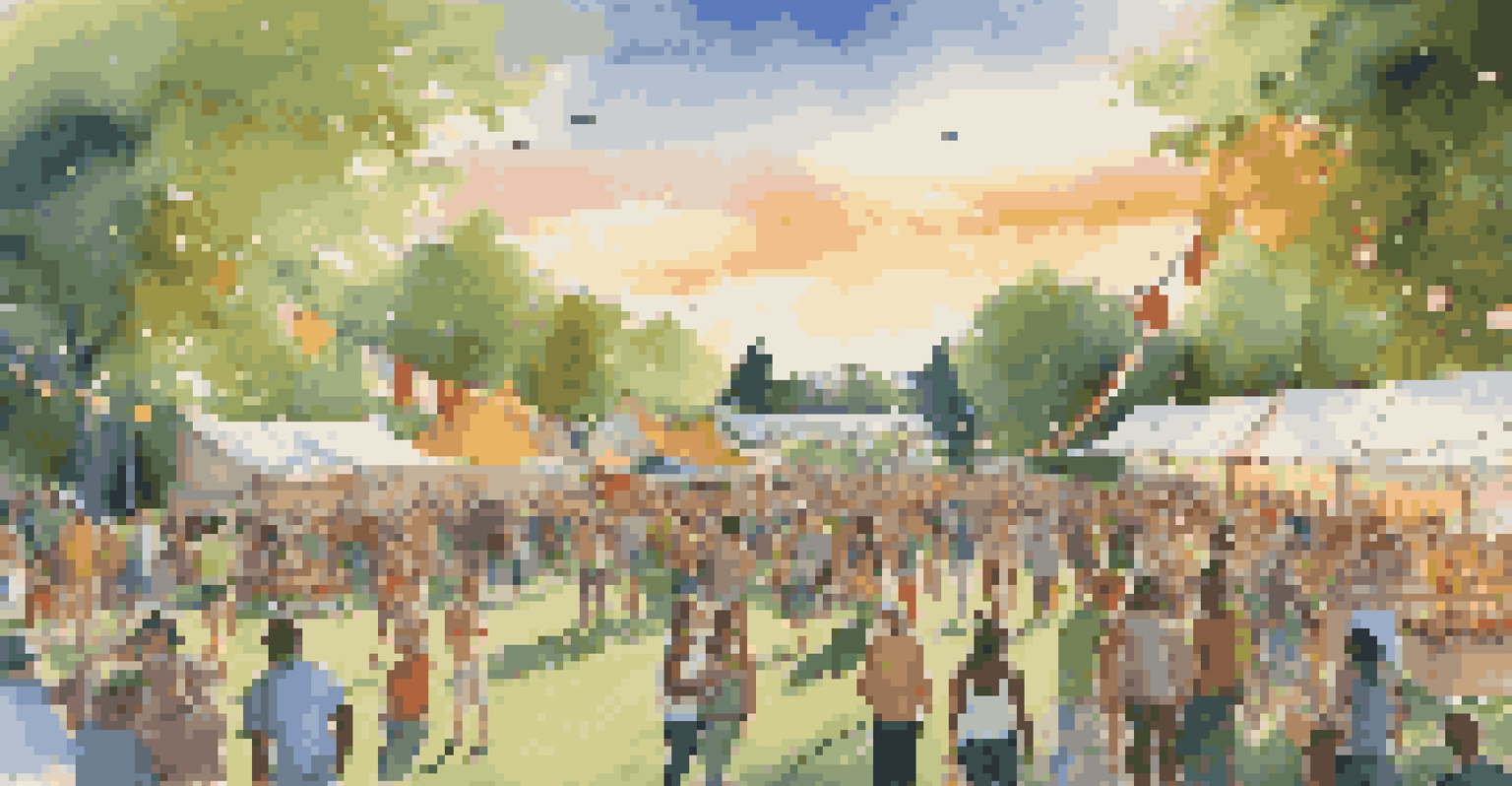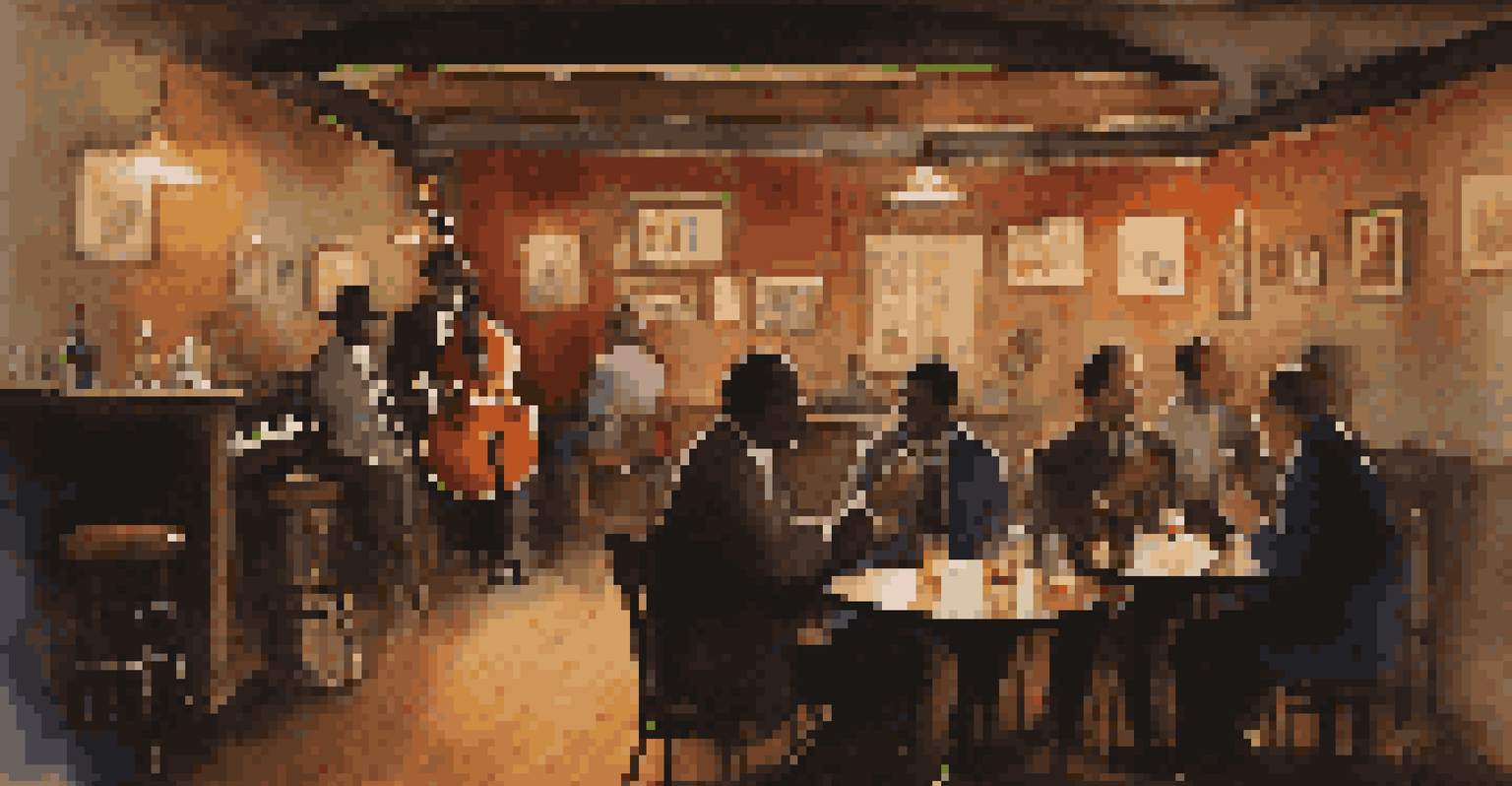The Relationship Between Music and Urban Tourism Growth

The Role of Music in Shaping Urban Identity
Music is often the heartbeat of a city, defining its culture and identity. From jazz in New Orleans to techno in Berlin, each city has its unique sound that attracts visitors. These musical elements not only create a sense of place but also foster community pride, which can enhance the tourism experience.
Music is the shorthand of emotion.
When tourists visit a city, they often seek authentic experiences, and music is a vital part of that. Festivals, local bands, and street performances provide visitors with a taste of the local vibe. This engagement with music creates memorable experiences that encourage tourists to share their stories, further promoting the city.
Moreover, music festivals can draw thousands of visitors, turning a city into a temporary hub of creativity and culture. Such events stimulate the local economy, benefiting hotels, restaurants, and shops. The synergy between music and tourism can lead to sustained growth for urban areas.
Music Festivals as Catalysts for Urban Tourism
Music festivals are significant drivers of urban tourism growth, transforming cities into vibrant destinations. Events like Coachella in California or Glastonbury in the UK showcase local talent and attract global audiences. These festivals not only highlight a city’s musical culture but also provide a platform for local businesses to thrive.

The influx of visitors during these festivals translates to increased hotel bookings, restaurant reservations, and retail sales. For instance, a small town hosting a music festival can see a dramatic rise in foot traffic, boosting its economy significantly over a short period. This creates a ripple effect, encouraging further investment in local infrastructure.
Music Shapes Urban Identity
Music acts as a cultural heartbeat for cities, drawing tourists and fostering community pride.
Furthermore, these events often promote cultural exchange, drawing diverse crowds who share their experiences online. This digital storytelling creates a buzz, inspiring future tourists to visit the city. The result is a powerful cycle where music festivals continually enhance urban tourism growth.
Local Music Scenes Boosting Tourism
Local music scenes contribute significantly to urban tourism by offering unique experiences that tourists crave. From intimate jazz clubs to vibrant street performances, these venues provide a taste of the local flair. Tourists often seek out these spots to immerse themselves in the culture, leading to a deeper connection with the city.
Without music, life would be a mistake.
Supporting local artists not only enriches the community but also establishes a sense of belonging among visitors. When tourists attend gigs or discover local talent, they often share their experiences on social media, promoting the city as a music destination. This word-of-mouth marketing is invaluable for sustaining tourism.
Moreover, cities that actively promote their local music scenes tend to attract more visitors. By hosting open mic nights, community concerts, or music workshops, they create opportunities for engagement. This fosters a vibrant atmosphere that resonates with both tourists and locals alike, driving continued interest in the area.
Collaboration Between Cities and Artists
Collaboration between cities and artists can lead to innovative tourism strategies. Cities often partner with musicians to create unique experiences that highlight local culture. This not only enhances the visitor experience but helps artists gain exposure, creating a win-win scenario.
For example, cities might sponsor music-themed walking tours or create public art installations featuring local musicians. These collaborations provide tourists with an enriched experience, as they learn about the city's culture through its musical heritage. Such initiatives can transform a city into a must-visit destination for music lovers.
Festivals Drive Economic Growth
Music festivals significantly boost local economies by increasing tourism and supporting local businesses.
Additionally, these partnerships can lead to long-term relationships that benefit both parties. As cities invest in their music scenes, they not only attract tourists but also create jobs and support local economies. This sustainable approach ensures that both tourism and local music can thrive together.
The Economic Impact of Music on Urban Tourism
The economic impact of music on urban tourism is profound, contributing billions to local economies. Music events and festivals generate substantial revenue, benefitting various sectors such as hospitality, transportation, and retail. As tourists flock to these events, cities experience a noticeable boost in their economy.
In addition, local businesses thrive on the increased foot traffic generated by music tourism. Restaurants, bars, and shops often see a surge in sales during music events, creating job opportunities for residents. This economic ripple effect highlights the importance of investing in the music industry to sustain growth.
Moreover, cities that embrace music tourism can enhance their global reputation. A thriving music scene can attract international visitors, leading to increased investment and interest in the area. This can spur further development, making the city an even more attractive destination for future tourists.
Cultural Significance of Music in Urban Spaces
Music holds cultural significance in urban spaces, acting as a reflection of the city's history and diversity. From traditional folk songs to contemporary genres, every sound tells a story about the community. Tourists are often drawn to these narratives, seeking to understand the city through its music.
Engaging with local music can foster a sense of belonging among visitors, as they connect with the culture on a deeper level. This connection encourages them to share their experiences, further promoting the city as a cultural hotspot. Music thus becomes a bridge, linking tourists to the heart of the city.
Collaboration Enhances Tourism
Partnerships between cities and artists create unique experiences that attract visitors and enrich local culture.
Additionally, cities that celebrate their musical heritage often see a rise in cultural tourism. By highlighting local musicians and their stories, cities can attract visitors interested in exploring unique cultural experiences. Ultimately, this enriches both the visitor's experience and the local community.
Future Trends in Music and Urban Tourism
The future of music and urban tourism is set to evolve as technology and trends change. Virtual reality concerts and online music experiences are already transforming how people engage with music. This shift could lead to new forms of tourism that blend the physical and digital worlds.
As cities adapt to these trends, they may explore innovative ways to attract tourists. For instance, integrating augmented reality into live performances could enhance the visitor experience, appealing to tech-savvy travelers. This innovative approach keeps the city relevant and engaging for future generations.

Moreover, sustainability will play a crucial role in the future of music tourism. Cities will need to balance the economic benefits of tourism with the preservation of their musical heritage. By focusing on sustainable practices, they can ensure that both music and urban tourism thrive harmoniously.